- Home
- Brand, Max
Riders of the Silences Page 2
Riders of the Silences Read online
Page 2
"Father, I thank thee, and if my mind were as old as thine I might be able to wish blessings as great as these in return."
"Stand up!" cried Father Anthony. "By Heavens, Jean Paul, it is the purest Latin I have heard this twelvemonth."
And the lad answered: "It must be pure Latin; Father Victor has taught me."
Gabrielle Anthony stared, and to save him from too obvious confusion the other priest interrupted: "I have a letter for you, my son."
And he passed the envelope to Pierre. The latter examined it with interest.
"The writing sprawls like the knees of a boy of ten. What old man has written to you, Pierre?"
"No man that I know. This comes from the south. It is marked from the United States."
"So far!" exclaimed the tall priest. "Give me the letter, lad."
But here he caught the whimsical eyes of Father Anthony, and he allowed his outstretched hand to fall. Yet he scowled as he said: "No; keep it and read it, Pierre."
"I have no great wish to keep it," answered Pierre, studying anxiously the dark brow of the priest.
"It is yours. Open it and read."
The lad obeyed instantly. He shook out the folded paper and moved a little nearer the light. Then he read aloud, as if it had never entered his mind that what was addressed to him might be meant for his eyes alone. And as he read he reminded Father Anthony of some childish chorister pronouncing words beyond his understanding. The tears came to the eyes of the good father.
And he said in his heart: "Alas! I have been too much in the world of men, and now a child can teach me."
The musical voice of the boy began:
"Morgantown,
"R. F. D. No. 4.
"SON PIERRE:
"Here I lie with a chunk of lead from the gun of Bob McGurk resting somewheres in the insides of me, and there ain't no way of doubting that I'm about to go out. Now, I ain't complaining none. I've had my fling. I've eat my meat to order, well done and rare—mostly rare. Maybe some folks will be saying that I've got what I've been asking for, and I know that Bob McGurk got me fair and square, shooting from the hip. That don't help me none, lying here with a through ticket to some place that's farther south than Texas."
Pierre lowered the letter and looked gravely upon Father Victor.
"There are blasphemies coming. Shall I read on?"
"Yes."
He began again, a little spot of red coming into either cheek:
"Hell ain't none too bad for me, I know. I ain't whining none. I just lie here and watch the world getting dimmer until I begin to be seeing things out of my past. That shows the devil ain't losing no time with me. But the thing that comes back oftenest and hits me the hardest is the sight of your mother, lying with you in the hollow of her arm and looking up at me and whispering, 'Dad,' just before she went out."
The hand of the boy fell, and his wide eyes sought the face of Father Victor. The latter was standing.
"You told me I had no father—"
An imperious arm stretched toward him.
"Give me the letter."
He moved to obey, and then checked himself.
"This is my father's writing, is it not?"
"No, no! It's a lie, Pierre!"
But Pierre stood with the letter held behind his back, and the first doubt in his life stood up darkly in his eyes. Father Victor sank slowly back into his chair. All his gaunt frame was trembling.
"Read on," he commanded.
And Pierre, white of face, read on:
"So I got a idea that I had to write to you, Pierre. There ain't nothing I can make up to you, but knowing the truth may help some. Poor kid, you ain't got no father in the eyes of the law, and neither did you have no mother, and there ain't no name that belongs to you by rights."
Father Anthony veiled his eyes, but the bright starved eyes of Jean Paul Victor stared on at the reader. His voice was lower now, and the lips moved slowly, as though numb with cold:
I was a man in them days, and your mother was a woman that brought your heart into your throat and set it singing. She and me, we were too busy being just plain happy to care much what was right or wrong; so you just sort of happened along, Pierre. Me being so close to hell, I remember her eyes that was bluer than heaven looking up to me, and her hair, that was copper with gold lights in it, ran down across the white of her shoulder, and even past her side and around you, Pierre, till it seemed like you was lying in a red river. She being about all in, she got hold of my hand and looked up to me with them blue eyes I been talking about, and said 'Dad,' and went out. And I damned near followed her.
"I buried Irene on the side of the mountain under a big, rough rock, and I didn't carve nothing on the rock. Then I took you, Pierre, and I knew I wasn't no sort of a man to raise up the son of Irene; so I brought you to Father Victor on a winter night and left you in his arms. That was after I'd done my best to raise you and you was just about old enough to chatter a bit. There wasn't nothing else to do. My wife, she went pretty near crazy when I brought you home. And she'd of killed you, Pierre, if I hadn't took you away.
"You see, I was married before I met Irene. So there ain't no alibi for me. I just acted the hound. But me being so close to hell now, I look back to that time, and somehow I see no wrong in it still.
"And if I done wrong then, I've got my share of hell-fire for it. Here I lie, with my boys, Bill and Bert, sitting around in the corner of the room waiting for me to go out. They ain't men, Pierre. They're wolves in the skins of men. They're the right sons of their mother. When I go out they'll grab the coin I've saved up, and leave me to lie here and rot, maybe.
"Lad, it's a fearful thing to die without having no one around that cares, and to know that even after I've gone out I'm going to lie here and have my dead eyes looking up at the ceiling. So I'm writing to you, Pierre, part to tell you what you ought to know; part because I got a sort of crazy idea that maybe you could get down here to me before I go out.
"You don't owe me nothing but hard words, Pierre; but if you don't try to come to me, the ghost of your mother will follow you all your life, lad, and you'll be seeing her blue eyes and the red-gold of her hair in the dark of the night as I see it now. Me, I'm a hard man, but it breaks my heart, that ghost of Irene. So here I'll lie, waiting for you, Pierre, and lingering out the days with whisky, and fighting the wolf eyes of them there sons of mine. If I weaken—If they find they can look me square in the eye—they'll finish me quick, and make off with the coin. Pierre, come quick.
"MARTIN RYDER."
The hand of Pierre dropped slowly to his side, and the letter fluttered with a crisp rustling to the floor.
CHAPTER III
THE LAUNCHING OF THE BOLT
Then came a voice that startled the two priests, for it seemed that a fourth man had entered the room, so changed was it from the musical voice of Pierre.
"Father Victor, the roan is a strong horse. May I take him?"
"Pierre!" and the priest reached out his bony hands.
But the boy did not seem to notice or to understand.
"It is a long journey, and I will need a strong horse. It must be eight hundred miles to that town."
"Pierre, what claim has he upon you? What debt have you to repay?"
And Pierre le Rouge answered: "He loved my mother."
He raised his face a little higher and smiled upon them.
"It is a beautiful name, is it not—Irene?"
There was no voice from Jean Paul Victor, so he turned to Father Anthony.
"It is a charming name, Pierre."
"I would give my revolver with the pearl handle, and my skates, and the engraven knife of old Canole just for one glimpse of her."
"You are going?"
The boy asked in astonishment: "Would you not have me go, Father?"
And Jean Paul Victor could not meet the sorrowful blue eyes.
He bowed his head and answered: "My child, I would have you go. But promise with your hand in mine that yo
u will come back to me when your father is buried."
The lean fingers caught the extended hand of Pierre and froze about it.
"But first I have a second duty in the southland."
"A second?"
"You taught me to shoot and to use a knife. Once you said: 'An eye for an eye, and a tooth for a tooth.' Father Victor, my father was killed by another man."
"Pierre, dear lad, swear to me here on this cross that you will not raise your hands against the murderer. 'Vengeance is mine, saith the Lord.'"
"He must have an instrument for his wrath. He shall work through me in this."
"Pierre, you blaspheme."
"'An eye for an eye, and a tooth for a tooth.'"
"It was a demon in me that quoted that in your hearing, and not myself."
"The horse, Father Victor—may I have the roan?"
"Pierre, I command you—"
The light in the blue eyes was as cold and steady as that in the starved eyes of Jean Paul Victor.
"Hush!" he said calmly. "For the sake of the love that I bear for you, do not command me."
"Pierre, I have prayed God for you night and morning, and for the sake of those prayers which are dearer than gold in heaven, stay with me!"
"Dear Father Victor, you also hope for hands that love you to close your eyes at the end."
And the stern priest dropped his head. He said at last: "I have nothing saving one great and terrible treasure which I see was predestined to you. It is the cross of Father Meilan. You have worn it before. You shall wear it hereafter as your own."
He took from his own neck a silver cross suspended by a slender silver chain, and the boy, with startled eyes, dropped to his knees and received the gift.
"It has brought good to all who possessed it, but for every good thing that it works for you it will work evil on some other. Great is its blessing and great is its burden. I, alas, know; but you also have heard of its history. Do you accept it, Pierre?"
"Dear Father, with all my heart."
The colorless hands touched the dark-red hair, and the prophet eyes of the priest went up.
"God pardon the sins you shall commit."
Pierre crushed the hand of Jean Paul Victor against his lips and rushed from the room, while the tall priest, staring down at the fingers which had been kissed, pronounced:
"It is better that he should commit murder with his hands than to slay in his evil thoughts."
"Can you resign him like this?"
"I have forged a thunderbolt. Father Gabrielle, you are a prophet. It is too great for my hand. Listen!"
And they heard clearly the sharp clang of a horse's hoofs on the hard-packed snow, loud at first, but fading rapidly away. The wind, increasing suddenly, shook the house furiously about them.
It was a north wind, and traveled south before the rider of the strong roan. Over a thousand miles of plain and hills it passed, and down into the cattle country of the mountain-desert which the Rockies hem on one side and the tall Sierras on the other.
It was a trail to try even the endurance of Pierre and the strong roan, but the boy clung to it doggedly. On a trail that led down from the edges of the northern mountain the roan crashed to the ground in a plunging fall, hitting heavily on his knees. He was dead before the boy had freed his feet from the stirrups.
Pierre threw the saddle over his shoulder and walked eight miles to the nearest ranchhouse, where he spent practically the last cent of his money on another horse, and drove on south once more.
There was little hope in him as day after day slipped past. Only the ghost of a chance remained that Martin Ryder could fight away death for another fortnight; yet Pierre had seen many a man from the mountain-desert stave off the end through weeks and weeks of the bitterest suffering. His father must be a man of the same hard durable metal, and upon that Pierre staked all his hopes.
And always he carried the picture of the dying man alone with his two wolf-eyed sons who waited for his eyes to weaken. Whenever he thought of that he touched his horse with the spurs and rode fiercely for a time. They were his flesh and blood, the man, and even the two wolf-eyed sons.
So he came at last to a gap in the hills and looked down on Morgantown in the hollow, twoscore unpainted houses sprawling along a single street. The snow was everywhere white and pure, and the town was like a stain on the landscape with wisps of smoke rising and trailing across the hilltops.
Down to the edge of the town he rode, left his cow-pony standing with hanging head outside a saloon, strode through the swinging doors, and asked of the bartender the way to the house of Martin Ryder.
The bartender stopped in his labor of rubbing down the surface of his bar and stared at the black-serge robe of the stranger, with curiosity rather than criticism, for women, madmen, and clergymen have the right-of-way in the mountain-desert.
He said: "Well, I'll be damned!—askin' your pardon. So old Mart Ryder has come down to this, eh? Partner, you're sure going to have a rough ride getting Mart to heaven. Better send a posse along with him, because some first-class angels are going to get considerable riled when they sight him coming. Ha, ha, ha! Sure I'll show you the way. Take the northwest road out of town and go five miles till you see a broken-backed shack lyin' over to the right. That's Mart Ryder's place."
Out to the broken-backed shack rode Pierre le Rouge, Pierre the Red, as every one in the north country knew him. His second horse, staunch cow-pony that it was, stumbled on with sagging knees and hanging head, but Pierre rode upright, at ease, for his mind was untired.
Broken-backed indeed was the house before which he dismounted. The roof sagged from end to end, and the stove pipe chimney leaned at a drunken angle. Nature itself was withered beside that house; before the door stood a great cottonwood, gashed and scarred by lightning, with the limbs almost entirely stripped away from one side. Under this broken monster Pierre stepped and through the door. Two growls like the snarls of watch-dogs greeted him, and two tall, unshaven men barred his way.
Behind them, from the bed in the corner, a feeble voice called: "Who's there?"
"In the name of God," said the boy gravely, for he saw a hollow-eyed specter staring toward him from the bed in the corner, "let me pass! I am his son!"
It was not that which made them give back, but a shrill, faint cry of triumph from the sick man toward which they turned. Pierre slipped past them and stood above Martin Ryder. He was wasted beyond belief—only the monster hand showed what he had been.
"Son?" he queried with yearning and uncertainty.
"Pierre, your son."
And he slipped to his knees beside the bed. The heavy hand fell upon his hair and stroked it.
"There ain't no ways of doubting it. It's red silk, like the hair of Irene. Seein' you, boy, it ain't so hard to die. Look up! So! Pierre, my son! Are you scared of me, boy?"
"I'm not afraid."
"Not with them eyes you ain't. Now that you're here, pay the coyotes and let 'em go off to gnaw the bones."
He dragged out a small canvas bag from beneath the blankets and gestured toward the two lurkers in the corner.
"Take it, and be damned to you!"
A dirty, yellow hand seized the bag; there was a chortle of exultation, and the two scurried out of the room.
"Three weeks they've watched an' waited for me to go out, Pierre. Three weeks they've waited an' sneaked up to my bed an' sneaked away agin, seein' my eyes open."
Looking into their fierce fever brightness, Pierre understood why they had quailed. For the man, though wrecked beyond hope of living, was terrible still. The thick, gray stubble on his face could not hide altogether the hard lines of mouth and jaw, and on the wasted arm the hand was grotesquely huge. It was horror that widened the eyes of Pierre as he looked at Martin Ryder; it was a grim happiness that made his lips almost smile.
"You've taken holy orders, lad?"
"No."
"But the black dress?"
"I'm only a novice. I've sworn no vow
s."
"And you don't hate me—you hold no grudge against me for the sake of your mother, Pierre?"
He took the heavy hand.
"Are you not my father? And my mother was happy with you. For her sake I love you."
"The good Father Victor. He sent you to me."
"I came of my own will. He would not have let me go."
"He—he would have kept my flesh and blood away from me?"
"Do not reproach him. He would have kept me from a sin."
"Sin? By God, boy, no matter what I've done, is it sin for my son to come to me? What sin?"
"The sin of murder!"
"Ha!"
"I have come to find McGurk."
CHAPTER IV
THE CORNER PLOT
Like some old father-bear watching his cub flash teeth against a stalking lynx, half proud and half fearful of such courage, so the dying cattleman looked at his son. Excitement set a high and dangerous color in his cheek. His eyes were too bright.
"Pierre—brave boy! Look at me. I ain't no imitation-man, even now, but I ain't a ghost of what I was. There wasn't no man I wouldn't of met fair and square with bare hands or with a gun. Maybe my hands was big, but they were fast on the draw. I've lived all my life with iron on the hip, and my six-gun has seven notches.
"But McGurk downed me fair and square. There wasn't no murder. I was out for his hide, and he knew it. I done the provokin', an' he jest done the finishin', that was all. It hurts me a lot to say it, but he's a better man than I was. A kid like you, why, he'd jest eat you, Pierre."
Pierre le Rouge smiled again. He felt a stern and aching pride to be the son of this man.

 Alcatraz
Alcatraz the Long, Long Trail (1923)
the Long, Long Trail (1923)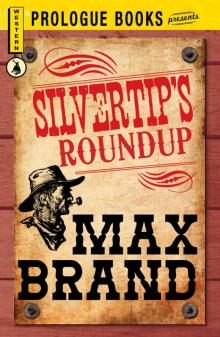 Silvertip's Roundup
Silvertip's Roundup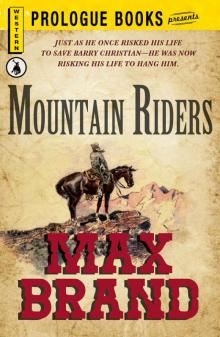 Mountain Riders
Mountain Riders Silvertip (1942)
Silvertip (1942)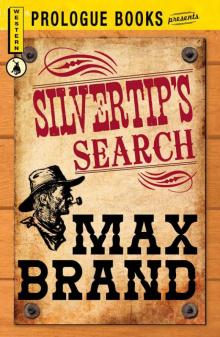 Silvertip's Search
Silvertip's Search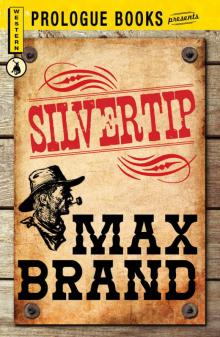 Silvertip
Silvertip Bull Hunter
Bull Hunter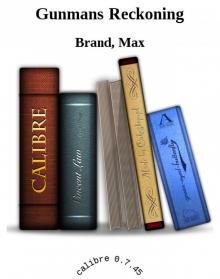 Gunmans Reckoning
Gunmans Reckoning The Seventh Man
The Seventh Man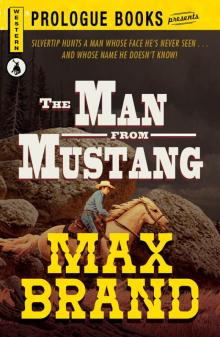 Man From Mustang
Man From Mustang Riders of the Silences
Riders of the Silences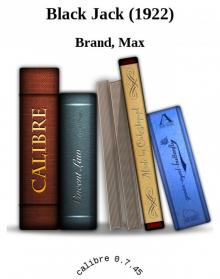 Black Jack (1922)
Black Jack (1922) Way of the Lawless
Way of the Lawless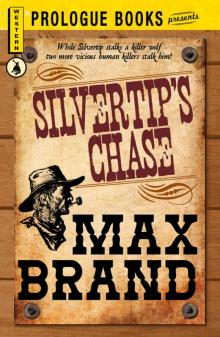 Silvertip's Chase
Silvertip's Chase Trailin
Trailin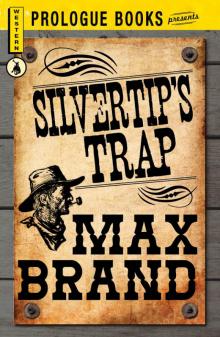 Silvertip's Trap
Silvertip's Trap Ronicky Doone (1921)
Ronicky Doone (1921) The Night Horseman
The Night Horseman the Garden Of Eden (1963)
the Garden Of Eden (1963)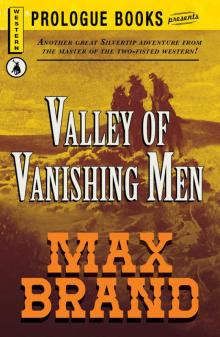 Valley of the Vanishing Men
Valley of the Vanishing Men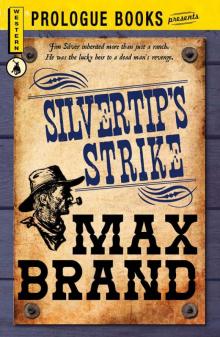 Silvertip's Strike
Silvertip's Strike Black Jack
Black Jack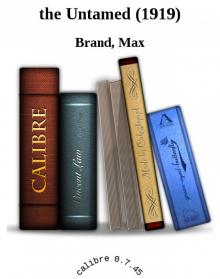 the Untamed (1919)
the Untamed (1919) Way Of the Lawless (1921)
Way Of the Lawless (1921) The Untamed
The Untamed